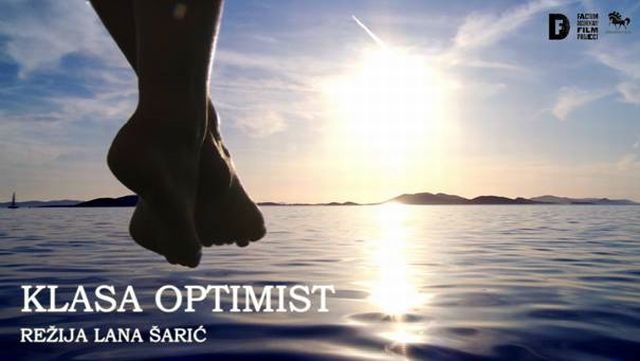A member of the Foundation’s Executive Board, Lana Šarić, herself a former leukemia patient, has directed her first documentary: “Klasa Optimist”. The film deals with the way patients face the potentially lethal disease and everything that happens to them after treatment.
Is it more important to clean the apartment or get out of the apartment and enjoy a perfect sunny day? What is it that really matters in our life? Can optimism be learned? “Klasa Optimist” is a film about dealing with the potentially lethal disease, leukemia, and everything that happens after treatment. When patients are cured, owing to a fortunate combination of medical achievements and doctors’ efforts, with the help of families and friends, and last, but certainly not least, owing to their own will force, their life will take a different turn. The most important thing they will need to face the different challenges is optimism.
“Klasa Optimist” will premiere on March 4, 2010 at 8 PM during the Zagrebdox Festival in Hall 1 of the Movieplex cinema at Kaptol Centre, Nova Ves 17. To learn more, go to: http://www.zagrebdox.net
Lana Šarić was born in Zagreb in 1983. She earned a degree in dramaturgy from the Academy of Dramatic Art in Zagreb. She writes for theatre and television and directs for theatre. ‘Klasa Optimist’ is the first film she has directed. Her favorite pastime is swimming.
During her treatment for leukemia, she was hospitalized on the same ward as Ana. They fought the same battle against the disease. After Ana’s death, she joined the Foundation as its active member and highlighted the problems that the patients, herself included, faced in fighting the disease. I will take this opportunity and quote Lana:
“We have a Foundation, a Registry and a cord blood bank, but this is still not enough for the patients. What remains to be done is not the Foundation’s job; it is something that should be done by the competent Ministry and the state. On the day they receive their diagnosis, the world crumbles to pieces for the people who were perfectly healthy only the day before. From what was a normal life, they have to learn to live a semi-life, to fight, to face isolation, to suffer months of hardship. Whoever has the misfortune of suffering that way deserves the best hospital conditions that exist; they deserve all medicines free of charge and all tests and analyses immediately, in Croatia and free of charge.”
Since the time this article was written, some things have changed. Croatia has purchased a PET scanner; patients are tested at the expense of the National Health Service (HZZO), the Hematology Department at Rebro Hospital is being refurbished and modernized; new hospital rooms are being built with en-suite bathrooms. We have witnessed some of the tragic cases from the Hematology Department that attracted public attention. However, one would not be wrong to conclude that those cases have gone a long way in demonstrating the kind of situations hematologists have to deal with and how thin the line is between life and death.
“We were mostly young and the problems we had to deal with were really banal – lack of infusion stands which would allow us to move around; inedible hospital food; uncomfortable hospital beds (during my first course of therapy, I had to spend 40 days in a room no bigger than a box. And that room was my whole world), a lack of toilets and bathrooms, no ventilation, a shortage of hospital beds…
“Many patients had to be treated abroad or they had to bear the cost of their own therapy. What happens when one’s family does not have the money? What then? Should they go public? Should they suffer additional aggravation and pain? How must a child feel having to pose for Jutarnji list (a daily) in order to raise money for their own life? A hundred thousand kuna is not much for a large system. For an average Croatian family it is a fortune.
“The fact that the Hematology Department was able to successfully function at all during the two years that I was a regular visitor is a miracle. We have only the doctors and nurses to thank for that. Nearly everybody who was ever a patient at that department has felt the need to donate something to it or do something for it once they said their final goodbye. Sometimes I feel the urge to take a camera and show everybody how things really are, show what every sick person has to go through.
“A few months ago I said that I did not want anybody to have to write letters similar to Ana’s. Admittedly, her letter did stir Croatia into action. But my wish remains the same.”
Today, two years later, Croatian people face another big challenge: those who wish to have their names included in the Registry as potential bone marrow donors have an opportunity to do so. Some have grabbed the opportunity without any second thoughts; some have their doubts, which are probably due to the lack of information about possible health consequences to the donor. Croatians are altruistic people in principle. They are also becoming increasingly aware of the importance of volunteering to help the sick. The task of the institutions, the Foundation and of all of us is to destigmatize the concern that donating bone marrow poses any possible risk to the donor’s health.
